With zero cash burn and profit from day one, The Souled Store writes a new e-commerce story
Three youngsters from Mumbai turn their love for Star Wars into an online marketplace for pop culture merchandise. Next stop? Offline stores in Mumbai, Delhi and Bangalore.
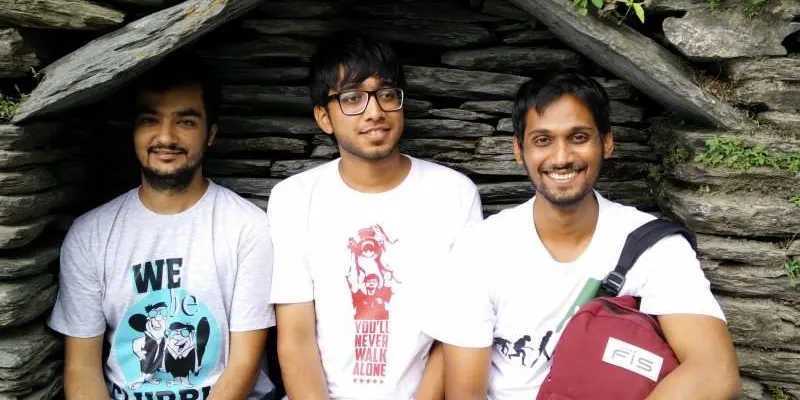
Honey Mehta (26), a Bengaluru-based writer, is a pop culture enthusiast who can’t have enough of Harry Potter products. Although she has not shopped online for apparel before, she turned to online channels when she could not find her favourite products in physical stores.
While e-commerce offers a larger selection than offline retail possibly can, pop culture merchandise is not a strong category in Indian e-tail. E-commerce market leaders Flipkart and Amazon India do offer some choices, but no platform existed as a one-stop store for such collections – till 2013. That’s when three youngsters from Mumbai put their love for Star Wars into a business and built an online platform for everything pop culture.
Today, The Souled Store is an online brand selling quirky pop culture merchandise.
Honey, now a loyal customer, has bought Friends and Harry Potter-themed T-shirts and note books on The Souled Store.
“They give official merchandise at great prices, with a personal touch. If I buy from Entertainment store, I get the product, but from The Souled Store, I get a Hogwarts letter with a Harry Potter t-shirt. I have recommended it to friends as it is the one-stop platform for everything,” she says.
The Souled Store today claims to be India’s largest online brand for big budget movies (Marvel, Batman, Superman, The Justice League, Harry Potter, Lord of the Rings, Star Wars, Raees, etc.), cartoons (Cartoon Network, Scooby Doo, Flintstones etc.), TV Shows (Friends, The Big Bang Theory, South Park etc.), and sports (WWE, IPL teams like Kolkata Knight Riders and Kings XI Punjab, kabaddi franchises) and much more.
The three co-founders - Vedang Patel, Rohin Samtaney and Aditya Sharma – all 28 years old - were hard-core fans of such franchises themselves.
Vedang is a mechanical engineer who began his career at TresVista, a boutique financial services firm, where he met Aditya and Rohin. The three identified an opportunity to sell official merchandise for popular entertainment channels in India, and that’s how the idea for thesouledstore.com was incubated.
Bootstrapped, with an initial investment of Rs 1.75 lakh, The Souled Store entered a market where they had little competition, and made profit from their first sale itself. Today they have 5,00,000 customers, and get more than 1,000 orders a day.
How they have grown in four years, and what they have planned for the next stage is a lesson for aspiring entrepreneurs.
An opportunity to be explored
In the last year of his job, Vedang got a double promotion. But entrepreneurship could not wait.
He recollects, “I have always been a fan of Star Wars and the like. Their merchandise was not easily available in India at the time. Even if it was, it was very expensive. I felt that I could easily do this in India. There are a lot of fans in India, so there’s a definite market.”
When The Souled Store started in June 2013, it was a fragmented market for quirky stuff. Unlike the US where licensing is a market worth $250 billion, in India, there were few small players but no market leader.

Vedang was not ready to be just another seller of apparel and accessories with some vague connection to pop culture.
“If you are passionate about the genre, you can come up with the best design ideas too. I knew we can do it cheaper and better – so why not give it a shot? It was about celebrating fandom, about what the customer wants, paying attention to quality and marketing our designs strongly,” he says.
The Souled Store’s target audience is in the age group of 16-30 years, a bulk of which is middle class - the biggest segment in India.
Vedang says The Souled Store had great brand recognition from the beginning.
“If we were a marketplace, we could not have had this unique identity of exclusive designs that sets us apart,” he says.
The Souled Store does marketing and inventory management, but no manufacturing as good quality products need massive capital.
Getting things right
While customer acquisition in e-commerce costs up to thousands of rupees, The Souled Store boasts of a customer acquisition cost many times lower than the industry norm – Rs 100.
Vedang explains how they got it right.
“We ensured that everything we do made sense in terms of profitability. From day one, there was no cash burn like our competitors for customer acquisition. In quirky fashion, competitors put the same artwork on every T-shirt; it may not even be good. But attention to detail was our USP. We did redesigning for everything and got copyright contracts.”
The company has a team of 75, including 18 designers - most of them graduates from NID and NIFT. The Souled Store offers more than 20 designs for each category.
“We never raised VC funding; this was about the business right. We started from a small room in 2013, and I have done everything from sweeping the floor to going to the manufacturer, sourcing and packing. All three partners were a part of everything. It helped us get everything correct - from quality to timeline,” Vedang adds.
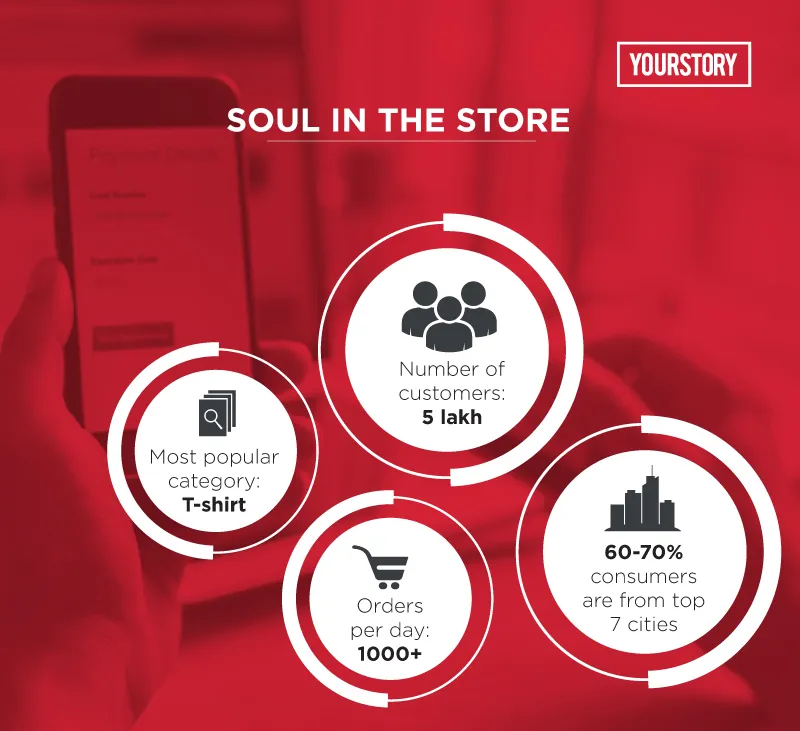
The Souled Store was particular about targeted marketing too. For instance, their online paid ads targeted specific demographics like Harry Potter and Wonder Woman fans aged 18-24 years. They even collaborated with 20-30 YouTube channels, including All India Bakchod, which promote them through Tweets and videos. Partnerships with IPL teams like Kolkata Knight Riders and Kings 11 Punjab, WWE and others help garner TV ads.
Vedang says, “We calculate the profitability of every single day: rent, salary, costs etc. Even in my CAT I had 99.9 percent in math; I was a statistics professor. All this was applied in our cash cycle and inventory management. I don’t understand cash burn – I am never spending more money than revenue!”
Working on differentiation
According to Vedang, designs are The Souled Store’s USP. “The conversion rate on our website is multiples of the industry average, showing that people love the content. We sell fun. Not just products,” he says.
For example, you could receive an authentic Sheldon’s roommate agreement in your Big Bang Theory order that is personalised for you. You get a personalised official Hogwarts acceptance letter exactly like the one Harry gets but with your name on it. Even when you call our customer service, you may be surprised when the call ends with a May the Force Be with You, if you ordered some Star Wars merchandise.
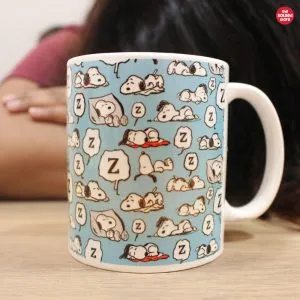
The Souled Store’s official merchandise is all co-branded. (Once they acquire a licence for official merchandise, they are presented with a set of original and ready designs. However, they add The Souled Store vibe and redesign most of it.)
“This is important since it’s the designs that allow us to stand out compared to other brands. We give the Licensor Royalty on total sales. We do not resell other brand’s products,” he says.
Yet, fake products easily available in the market pose a serious challenge to The Souled Store. Vedang says a lot of them are available online as well.
“However, a lot of market places are compliant and do take down the product when a complaint is lodged. Also, licensors are proactively taking legal action where possible. The Indian legal system, however, makes this process difficult at times,” he says.
In another unique offering, The Souled Store makes custom bulk orders directly for schools and colleges. They plan to scale it up once they have more organisational bandwidth. Although Bengaluru-based Alma Mater offers a similar service, Vedang says he does not see anyone as a competition.
“We pay attention to how we project ourselves; we make sure that we are always relevant, fresh. In fact, our biggest challenge is to catch up with demand,” he says.
Being based in Mumbai has given them many efficient designers from Mumbai, and an ecosystem which provides courier companies, payment gateways, developers, franchises etc.
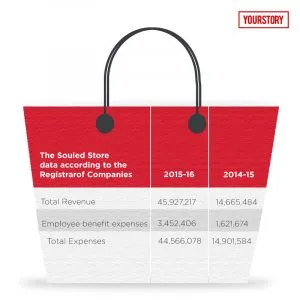
Building a clear future
Merchandising inspired by cinema, TV, and popular characters has been around for a while. It began in the 1980s, with Disney’s products for children. In the 1990s, Marvel comics brought it for adults and children alike. Cult movies like Star Wars joined the league around the same time. Soon, Batman and Superman merchandise followed.
Merchandising related to fashion, music, and sports icons was mostly related to clothing. There is also specific merchandise in the lifestyle category from Harley Davidson and Ferrari (like perfumes), which has been available in India for many years, for the consumer segment who wants to create a perception. However, it remains an insignificant part of the consumer expense.
E-commerce expert Arvind Singhal, Chairman of Technopak consultancy, says the fraction of consumers interested in figurines and other merchandising is small and the turnover is very low in India.
“It is not a rapidly growing market. But funky merchandise like that of Chumbak is in demand. Consumers are increasingly looking for such quirky merchandise,” he says.
According to Arvind, there will be space for many players in micro-specialist verticals. “But it is a small part of the business; the growth will be limited not by your capability but the size of the market. You can’t build a Rs 100 crore company out of it,” Arvind says.
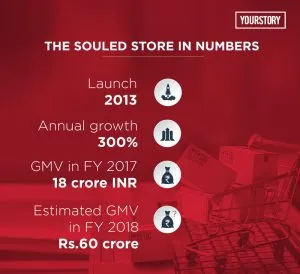
Yet The Souled Store, being the only platform to focus on the segment, is at an advantage.
According to Technopak, total consumer spending is about $650 billion in India, of which the Indian e-commerce market is worth $15 billion GMV. About 30 percent of it lies in mobile phones, 20 percent in consumer electronics, and 35 percent in clothing.
There is no need for market leaders like Amazon and Flipkart to push this category. They would rather focus on the above mentioned three categories, along with food and grocery items.
Time for the next step
Although the Souled Store has been growing at over 3 times annually without any external funding, Vedang says they could have grown more and done better if they were not limited by capital constraints in terms of inventory investments, upfront money to invest in merchandising licenses, team and operational size or other organisational constraints. So far, they have invested a total capital of Rs 5.25 lakh.
“The biggest challenge we currently face is the capital required to scale. In April 2017, we decided to do no more marketing and raised all our prices because demand was way bigger than supply – the organisation did not have the bandwidth for that. In order to not lose out on this potential, we decided to start looking for an investor who would not only help with capital but also guide us in this growth,” he says.
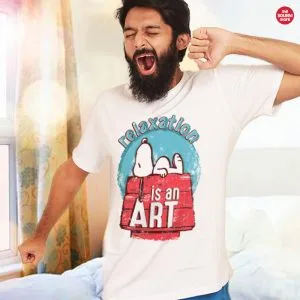
The Souled Store hopes to reach 10 lakh customers by March 2018. To achieve this, they are launching new products such as boxers, socks and women’s apparel along with a range of new designs and merchandising lines with a focus on sports. The team has already tied up with more than 50 brands for their official merchandise till date, with many more in the pipeline.
In 2018, the co-founders plan to open offline stores in Mumbai, Delhi and Bangalore – more as a branding exercise than to lead sales.
“We will have a flagship store and two popups in malls in these cities with a total investment of Rs 1 crore. This is all about providing an experience and for communication with the customer,” Vedang says.
Arvind, of Technopak, also says that although there is scope for such products online and offline, physical presence would work better because such products are mostly for impulsive buying.
The Souled Store was named after its three co-founders taking a plunge into entrepreneurship to do what they love, “to sell (their) souls” – in Vedang’s words. It looks like that plunge was worth the effort.







